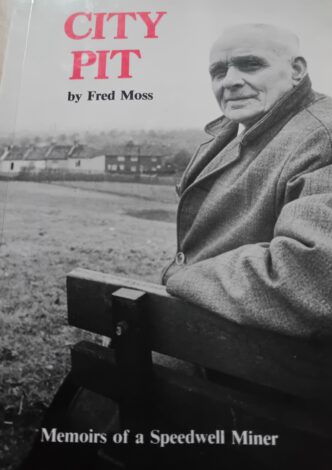This 70-page booklet, City Pit: memoirs of a Speedwell miner, tells the story of Fred Moss who lived and worked in east Bristol as a collier in several different pits.
Fred starts his story as a boy, telling of a strong community, living difficult hard lives but with sturdy solidarity in the face of adversity. He describes the benefits of mutual aid and respect in an area dominated by mining and associated trades, in a community which has largely passed and is now a historical memory.
He followed in his father’s footsteps as a miner, as did most of his school friends, explaining about how he was paid and worked with his dad hacking out coal seams and transporting it topside. He relates the importance of coal to Bristol’s industrial base and domestic use in the fireplaces of the city. He writes about the tools of the trade and how he was taught to be a miner.
As he grows to work independently, he describes the different pits he worked in, and importantly how dangerous the work was. He tells of accidents and the effect these had on the families of miners who died, and on those around them. The stories of the community coming out on the streets to show their respects for their fallen comrades is particularly touching and poignant. As is the practical help offered to the families of the deceased.
The book has numerous photographs of the old pits and more modern shots of what has replaced the pit heads. I was shocked to see that where I watched my son play rugby for Bristol Brunel Academy (previously Speedwell Secondary) was the site of Speedwell pit.
Also of interest was his description of the general strike of 1926. Most of the Kingswood colliers followed their union and struck for the duration. These were hard days for those in dispute and sacrifices were made. Eventually, the strike was unsuccessful as the government had stockpiled coal during an impasse before the strike. Those who did try to scab had to be escorted to work with a bag over their heads, whilst running the gauntlet of their disgruntled neighbours, with the women taking the lead.
Around this time, coal was being replaced by other types of fuel and the pits started to reduce production and eventually closed. The last pit in the east Bristol coalfield at Harry Stoke closed in 1963. Fred got other work but does miss the community.
Fred writes in a very accessible way, telling us that his state education was basic. However, he shows the importance of remembering that we all have a story to tell, as times change rapidly and our daily experiences become history. I do wonder what he would have made of climate change and the efforts to stop the continued extraction of fossil fuel.
A big shout out to Yaz O’Brien who recommended the book. She banged on about it to me and I fully agree with her recommendation. It is an excellent local history.
Steve Mills






Thanks for the great review,Fred was my grandad.He was a great one for telling stories.He lived down by the old st Anne’s boardmills then moved to southmead when they built the new estate.he had three sons ken(my dad) Arthur and Alex.
We must be distant relations. Fred was my uncle but I only met him once.
Wow he was my great grandad 🙂